What was the realest thing about this episode’s story lines to you?
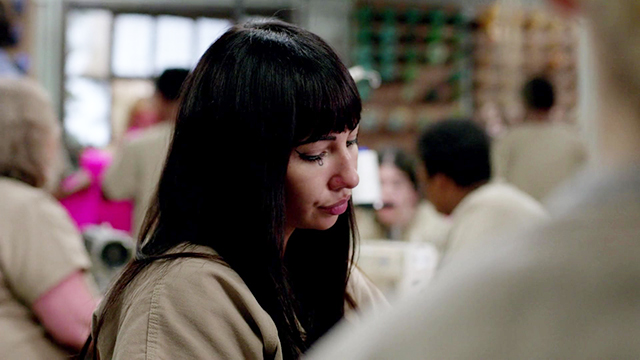
Laura Mandanas
There’s this quick little conversation that takes place between Flaca and Piper as they’re flipping through the lingerie catalog in Whispers.
Flaca: Man. Somehow my khakis be feeling extra khaki right now.
Piper: Oh come on, Gonzales. Looks are superficial. Everybody knows it’s about talent, originality, a sense of humor.
[Flaca catches Piper’s eye and they both crack up.]
Piper: What do you think it’s like to be her in real life? [Holds up another blonde in lingerie]
Flaca: Mmm. She eats pills and ice cream and cries at night, and she cuts herself, but on her scalp so no one can see.
Piper: So it’s still better than our lives!
Flaca: I would be her in a second.
I mean, I get that they’re bonding over being in prison. But also, I’ve had similar exchanges with female friends? Especially when I was younger and didn’t know anything about feminism. I remember being in high school and feeling so much pressure to be this certain kind of sexy — this white, skinny, unattainable, super consumable thing. I would have given anything to be that! I’d have traded my health and my happiness in a heartbeat, if I thought it would make me beautiful. At different times and in different ways, I have done that. I think a lot of us have.
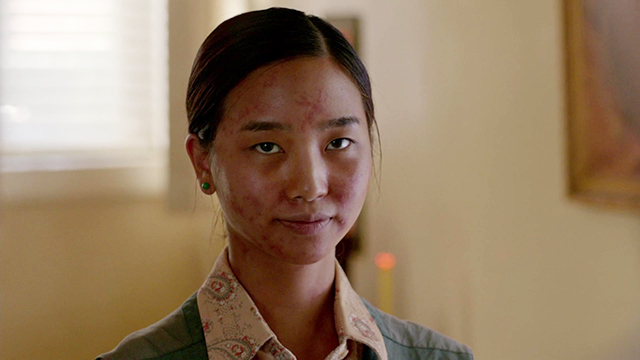
KaeLyn
When I saw the episode title flash on the screen, I immediately had two thoughts: 1) Finally, we are going to hear Chang say more than two words and 2) Is this going to be the worst? (Flashback to being bullied by kids in elementary school who would pull their eyes into slits and yell, “ching chang” at me.) Until this episode, Chang was a character that I couldn’t identify much with simply because she is barely ever written into the show. It’s annoying to me that in a show with so much diversity, the only season one Asian character is basically silent and written for comic relief.
On the other hand, being the only Asian girl in my mostly white neighborhood and life for most of my life, there was something annoyingly familiar about the dismissal of Chang’s existence. She doesn’t have a group of peers or even a friend in Litchfield. In the scene where she sits atop a picnic table to enjoy her Fritos/pea cake (good cook and thrifty, indeed), she looks across the yard at the different social groups thoughtfully. Some may have read this as loneliness, but I don’t get the sense that she wants to join them.
It is symbolically the moment Chang killed the male gaze in her life, decided not to give a fuck about her brother or being attractive to any man, and started investing in her own survival.
She has carved out this place on the margins that is comfortable, where she has learned to be alone and even cultivated some small perks (her cushy commissary job, her secret tablet to watch her shows). In fact, when Soso approaches her to attempt a connection, she pushes her away (by invalidating Soso’s ethnicity and saying she is Scottish, which was really hurtful, Chang!). I honestly relate more to Soso than to Chang, but I generally relate to the way that white people erase the identities of Asian women, either through outdated “mystical Chinese stereotypes” (Chang) or putting them in a white-washed model minority box (Soso, and also me).
How does this tie into beauty standards and Chang? It goes back to the matchmaking scene (ugh), where it is made quite clear to young Chang that she will not be able to rely on her looks because she is not conventionally beautiful. I related to the feeling that conventional beauty was a thing I’d never be able to reach, a way to access power that felt blocked off to me growing up. No matter how smart or hardworking I was, I could never be pretty enough.
In the end, it is Chang’s intellect and courage that saves her and continues to save her. Her one act of visibility, of standing front and center and looking the embodiment of that rejection in the eyes, could have been a moment of forgiveness. But young Chang chooses the knife. The pain of her invisibility is literally violent and I’d be lying if I said I wasn’t cheering for her. In the rewriting of that moment, the script Chang wrote for acting class, she reclaims that moment, literally eating her victim’s gall bladder/heart/dick/liver (I guess we’ll never know). It is symbolically the moment Chang killed the male gaze in her life, decided not to give a fuck about her brother or being attractive to any man, and started investing in her own survival.
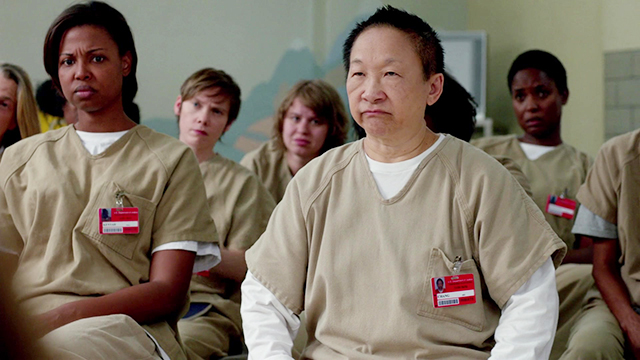
Fikri
Like KaeLyn, I was ready to hate this episode. (Spoiler alert: I kinda did.) You see the title “Ching Chong Chang” appear on your screen, after all, but then Chang says “Fuck you, cracker” to Pennsatucky and I feel like okay, maybe some balance has been restored in this world.
I know Heather’s summed up this episode as being about “the effects of cis white beauty ideals on all women” but what was most valuable to me about Chang’s storyline was that it wasn’t about that. Chang was subject to Chinese beauty standards, not white ones; while reconizing that they intersect and interact with each other in some ways, it’s important to recognize the differences in the standards of “beauty” that we’re held up to. Just as you can’t understand the Korean beauty industry through a white USAmerican lens, you can’t make sense of the experiences of an Asian migrant woman through Piper Chapman’s eyes. (But also maybe just never look at things in life through a Piper-tinted lens, ever.) Black Cindy and Flaca get at this in their conversation about black vs white standards of beauty.
Just as you can’t understand the Korean beauty industry through a white USAmerican lens, you can’t make sense of the experiences of an Asian migrant woman through Piper Chapman’s eyes.
If there’s anything to be salvaged from the mail-order bride/arranged marriage situation (I feel like neither of these terms 100% accurately describe what happened here, but I’m unsure what else to call it), it’s the brute honesty about the transactional nature of beauty and marriage, echoed in Red’s speech to Healey about stripping away a woman’s power and leaving her with only her sexuality. There’s plenty to be explored here from a feminist perspective by those with more patience than me, but honestly, the way this episode was written, Chang’s storyline was set up to be more mocking the assumed cultural backwardness of a specific racial community than truly interrogating the gendered dynamics of “beauty.” If we can dismiss Chang’s treatment as part of her “culture,” then we don’t have to think about the commodification of women’s looks and bodies in our own lives.
Still, the “girl power” ending to the in-prison dramatic reenactment was great.
Were there any parts of the conversations/stories that didn’t ring true?
Laura Mandanas
That scene in the parking lot with Chang — was it really necessary to have the martial arts come out? Because doing that with like, the mail order bride, the organized Asian crime, the broken English: it was a bit much. I found the heavy reliance on stereotypes throughout this story to be lazy.
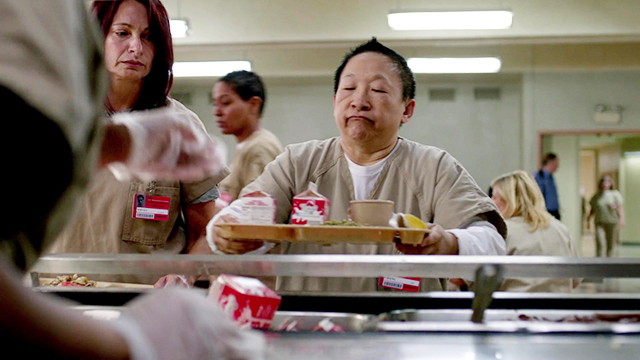
KaeLyn
There are just so many pieces of the Chang story that felt awfully stereotypical. The martial arts in the fight scene. The very stereotypical Chinese matchmaker scene. The Chinese gang who traffics illegal medicinal items from the Koreans. I mean, come on. It was one step away from going into “kung fu parody movie” mode. Chang has been a walking Chinese stereotype up to this point, for the audience and for other characters to ridicule. She barely speaks at all. Unlike Soso, who has at least had some story development, Chang just shuffles around in the background. She is the “sneaky Asian” and the “weird Chinese lady” and that is lazy writing. We are finally getting a chance to see where she comes from and why she is in Litchfield and I just wanted so much more for her. I wanted the nuance that other characters get that keep them from being only stereotypes, even if their storylines can also be stereotypical. I wanted something that felt real.
But I still loved parts of Chang’s story, especially seeing what she does at Litchfield every day. I want to see more of Chang and I’d really like to see more of Chang and So So talking to each other.
Fikri
Echoing everything that’s been said before: I hated the heavy use of stereotypes in this episode. I was hoping Chang would get a backstory similar to, say, Rosa’s past as a kickass bank robber, but nope, of course she was involved in smuggling turtle eggs. Of course! It’s also a bit of a stretch for smugglers to unhesitatingly turn into cold-blooded killers but why let that get in the way of convenient plot/character development, eh?
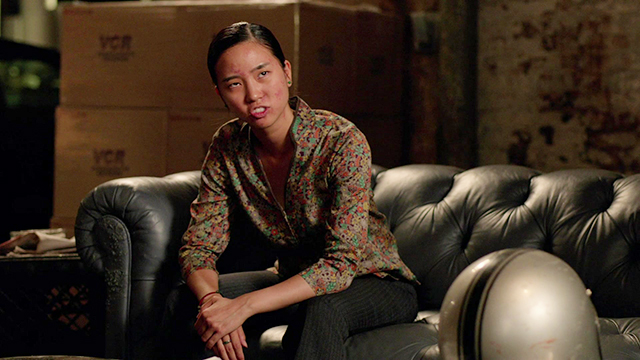
Yao
I was really glad that there was actually a back story for Chang (because I wouldn’t be surprised given past experience with American TV if the older Asian lady remained invisible). It was refreshing to see that Soso’s story isn’t the stereotypical drug smuggling/mail order bride/sex trafficking, but I see that they filled that in for Chang.
I love the part about Chang’s story where she talks back at the women who called her names; it felt very close to home when I was one of the few Asian faces in an American high school. People just talked and snickered through me. And as part of reality, it was my first year in the US so I indeed did not understand most of the English, and didn’t speak it very fluently either.
What’s tricky is to appreciate the episode on my own terms without endorsing the lazy use of stereotypes and deem it authentic.
Which brings me back to the stereotypical story line. Stereotypes stick around because there’s reality stuck to it. Illegal trades and mail order brides are not entirely made up, while the martial arts seems entirely superficial and sort of random. If there’s any benefits of that, I’d say it gave Asian actors more camera time.
I don’t hate the episode so much because I identify with the kind of solidarity that Chang shows. Her character didn’t get as much involvement in the show, just like Chang didn’t participate so much in American society/prison politics, and it unfortunately more or less accurately reflects reality. What’s tricky is to appreciate the episode on my own terms without endorsing the lazy use of stereotypes and deem it authentic.
Final Thoughts & Feelings
Laura Mandanas
Soso’s thing about white people seeing her as Chinese and Asian people seeing her as Scottish was really real. I’m happy they included that.

KaeLyn
The bathroom scenes between Piper and Chang in this episode were some of my favorite. In the first scene, Piper and Alex are making fun of Chang, whispering like she can’t see or hear them even though she is right there, when she confronts them, “Hey, lesbians. My eyes squinty, but ears work fine.” Later, when Piper is caught by Chang looking at herself in the mirror, they have this moment in reverse:
Piper: [admiring her pink panties in the mirror, doesn’t see Chang come into the bathroom]
Chang: You like Bo Derrick, Tarzan, 1981.
Piper: [mortified] Please pretend that you didn’t just see this.
Chang: I don’t see nothing. [turns back to mirror]
Piper: I just wanted to feel pretty.
Chang: [glances at Piper, nods]
Piper: Chang…I’m sorry about the other day.
Chang: Thank you, lesbian.
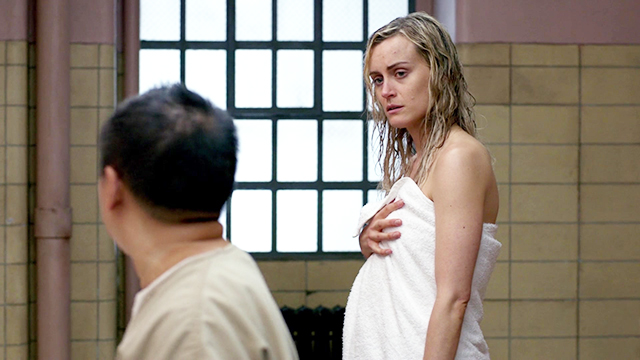
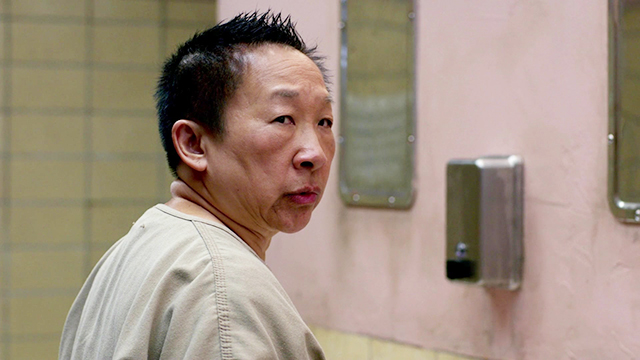
Chang doesn’t laugh at Piper. She understands. When Piper says Chang’s name and pauses and for a moment they just look at each other, there is this sincere expression on Chang’s face. It is one of the few times—maybe the only time—we see Chang make direct eye contact with another person in Litchfield. Her guard is down for just a second because maybe, maybe Piper is actually going to see her.
At the end of the day, Chang is still not much more than a sidenote, and this episode did little to undo the othering of her — setting her up as an isolated walking stereotype — that has been consistent throughout the show.
Fikri
My friend/Autostraddle member/A-Camp veteran Carmen C would like to add:
I wish the chinese in OITNB wasn’t so obviously translated from English. You cannot follow English grammatical rules for Chinese (as was yelled at me loudly and often by my Chinese teachers). For example “你说你要我们把他怎么办?” makes very little sense.
One last thing that bugs me about this episode (I’m sorry! I told you I hated it!) was that Chang’s backstory is probably not going to be worked into the rest of the prison’s story in any meaningful way, just as how Chang is going to be relegated back to the sidelines after this. (Compare this to, for example, the focus on Norma in the next episode. While previously a minor character too, Norma gets her own episode and it’s one that is of consequence to the main plotline and her character development.) At the end of the day, Chang is still not much more than a sidenote, and this episode did little to undo the othering of her — setting her up as an isolated walking stereotype — that has been consistent throughout the show.
Yao
At the end of the day I’m glad Chang’s story is in there, but it feels a bit like doing the bare minimum. I enjoyed the plot and hearing Chinese on American TV and seeing two Asian characters making a conversation in English (Because guess what? It happens IRL!!) but I cringe a little when people with little or no knowledge to Asian American history or the social context say ‘Chang’s story is so powerful and amazing’ because I don’t think it’s THERE.
Next episode: The origin of Norma’s misandry and her ascension to deity.







